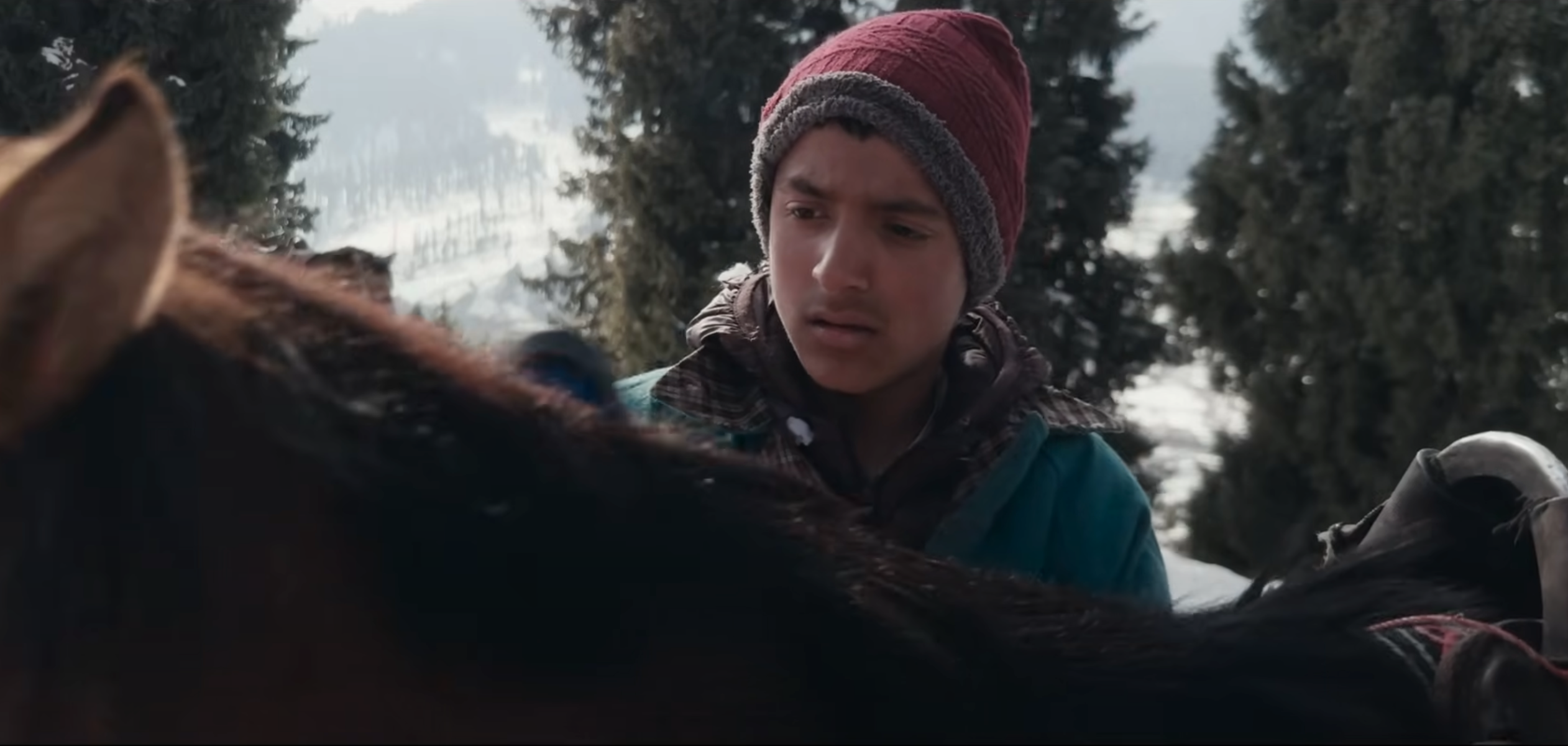


There’s a real thrill and joy in watching artists navigate their way around any form of imposition or restriction. The victory lies in whether they are able to turn the hovering mandate almost inconsequential with the sheer conviction in their telling.
24 Apr 2024

There’s a real thrill and joy in watching artists navigate their way around any form of imposition or restriction. The victory lies in whether they are able to turn the hovering mandate almost inconsequential with the sheer conviction in their telling. Among the bunch of five films selected for the 2024 MAMI Select-Filmed on iPhone Programme, these three shine the brightest, brilliantly interweaving the personal and the political with their context and setting.
Set in Srinagar, Faraz Ali’s Óbur is a gentle and plangent story about Suppu (Aaqib Nazir Dinda), a young boy who’s trying his best to find medical recommendations for his sick, bedridden mother. We don’t see her face; the sores on her back are her sole marker, which the kid diligently films on his phone and posts online so as to scour for tips from people with a similar ailment or a doctor who may take kind notice. Suppu’s father abandoned them after he took a new wife. His mother single-handedly raised him until she fell sick. The two live on the remote reaches. Suppu has just got his horse as a companion, on whose back he makes his rides to town.
To waive off debt from a shopkeeper, he gives up a phone gifted to him by a tourist. But he insists on access to the data it has. The woman at the shop assures him she will upload it to the Cloud, which he can use at any time. This perplexes the boy since he is not aware of what it means and implies. They inform him it’s another kind of Óbur (Kashmiri term for cloud), as they explain. Crisis strikes when Suppu’s mother dies, and pictures of her are required for the funeral rites. However, he has none at home. All of it is in the data stash. He keeps returning to the shop for the data but finds it closed. The connective thread to his memories of his mother becomes increasingly precarious.
Óbur rests primarily on Anand Bansal’s spellbinding camerawork and Mahak Gupta’s sublime color-grading (Gupta’s behind all three short films that are highlighted in this article). The two are consistently brilliant. A cursory glance at their credits makes for a whole trip through some of the most stunning recent Indian films. Crucially, the snowy expanse doesn’t just look breathtaking but also signifies the vast, unpredictable, looming personal journey the young protagonist has ahead of him. Faraz Ali’s evocative, deeply tender direction ensures an utterly transporting experience. He keeps the veneer seemingly simple (the wordplay is cheeky). However, within the contained scope, he mines unexpected sly humor and an enveloping emotional profundity. Almost sneakily, he creates such an affective, delicate bond between us and the young, grasping boy that you can’t help but feel intensely for him by the quietly overwhelming conclusion. Óbur is a little marvel.

Arguably the most immersive and visually realized of the lot, Archana Atul Phadke’s Mirage is so richly textured in its world-building. Every physical, tangible element of the Jaisalmer desert thrusts with palpable force. Dry, hot gales, crawling beetles, parched ruggedness of the sands, blasts of dusty wind-all vividly captured by DOP Amith Surendran and aided by Kalhan Raina’s intuitive, layered sound design gather an epic sense of scale. While the stunning opening sequence initially seems hard to top, Phadke slowly constructs the psycho-spatial dimensions of her tale with such persuasion she has you thoroughly gripped and almost entranced. There’s care, detail, and attention the film has in evoking a certain corporeality, binding vast, open space and speck-like characters traversing it in a way that both seem inextricable and yet chafing at one another. Even the utter, serene stillness that occasionally fills the scenery has a personality of its own.
Following a teenage boy, Ali, who helps out his family in various work errands, be it selling beer to passing-by tourists or other stuff, the film hits thrilling heights, particularly when it pushes at the experiential. The only reprieve Ali has is the game on his phone, which he loses himself in. It practically subsumes him. Phadke builds to an extraordinary, dizzying night-time sequence, fusing flashlights and fireworks into a heightened, illusory state where imagination and desire wrest from a grimmer reality, a moment of pure, delirious exhilaration.
It left me breathless. Even if the landscapes of the desert occupy the central role in the film, Phadke finds a terrific actor, Ali Sher Khan, whose face in close-ups renders alive the entire magnitude of his circumstance without a scrap of dialogue. His look in the exchange with Ankit Arora in the final scene will haunt me for a while. It’s a spectacular film.

A still from Jal Tu Jalaal Tu.
Prateek Vats (Eeb Allay Ooo!) and Shubham’s Jal Tu Jalaal Tu zero in on a garment factory whose employees are so hard-pressed and put under extreme routines that there are even bells installed outside bathrooms that keep a tight leash on toilet time. The bell accrues powerfully loaded symbolism in the narrative. Soon enough, the supervisor warns that for every ten minutes they take on top of their lunch break, they have to put in an additional twenty minutes’ worth of work. The system has almost a touch of ruthless absurdity to it, though it is emblematic of unbendingly dehumanizing working-class conditions all over India.
Prateek and Shubham, who share writing and directing credits, are quickly consolidating their position as the most incisive artists of our times, casting a laser-like gaze on the country’s sociopolitical fabric with uncompromising severity. What distinguishes them is their work rarely turns hectoring despite having a seething underside. There’s always some cheekiness that keeps any sober self-seriousness at a distance that’s neither too cloistering nor conveniently detached.
A superlative Harish Khanna grounds it all. He plays the senior-most employee at the factory, Madan, who has spent most of his life at the factory. But all the years of service have had barely any effect on matters of basic dignity. We gauge that he has mostly kept himself in line with orders passed, slaving away to please his superiors. The mere notice of his boss is enough to make his day. However, there’s not an ounce of acknowledgment. One day, at work, he bursts into a fit of laughter. What sparks it is not underlined, but the laughter is infectious. Everyone joins in. Incidentally, it catches the notice of the boss.
Madan is distressed by the fact he has been seen laughing. Immediately, he seeks to dissociate himself from having incited the collective fit. He is incensed when one of the more assertive junior tailors, Suman (a scene-stealing Aamir Aziz) suggests if he was actually laughing at his superior. Madan cannot even imagine himself doing such a slight. He is deeply upset just by the realization that the boss has seen him laughing. He feels as if he has betrayed or breached some fundamental norm. But has Madan always been so compliant, meek, and profusely apologetic?
The screenplay is wise enough to pepper in telling little nuggets, like when an enraged Suman accuses that Madan’s age has made him supine or a carelessly hurled threat of firing, that allude it could very well be the crushing job precarity which has slowly sucked resistance out of him. When Madan finally lets it rip, Khanna summons a raging release that feels positively seismic.
The film’s biggest weapon is its screenplay. It is razor-sharp and biting, filled with acute nuance. Its interrogating jabs are fierce and pointed. A worker lashes out that the factory shouldn’t take up assignments if it doesn’t even have the requisite workforce. Another moment, when Madan’s son reminds his mother that his school project they are working on has the temple missing, which his teacher had stressed, is subtle but makes its point with resounding clarity.
Vital in its register of protest, Jal Tu Jalaal Tu is a work of searing power. It’s a bristling snapshot of the explosive capacity embedded in the working class, their growing disaffection, tremendously powerful gestures of solidarity, and the very tipping point for oppression to trigger defiance. The coda gave me shivers as the film wends up to the exultant, rousing title song. Prateek Vats and Shubham have delivered a volcanic burst of a film.
The films are available to watch on the MAMI YouTube channel.
Share Article: